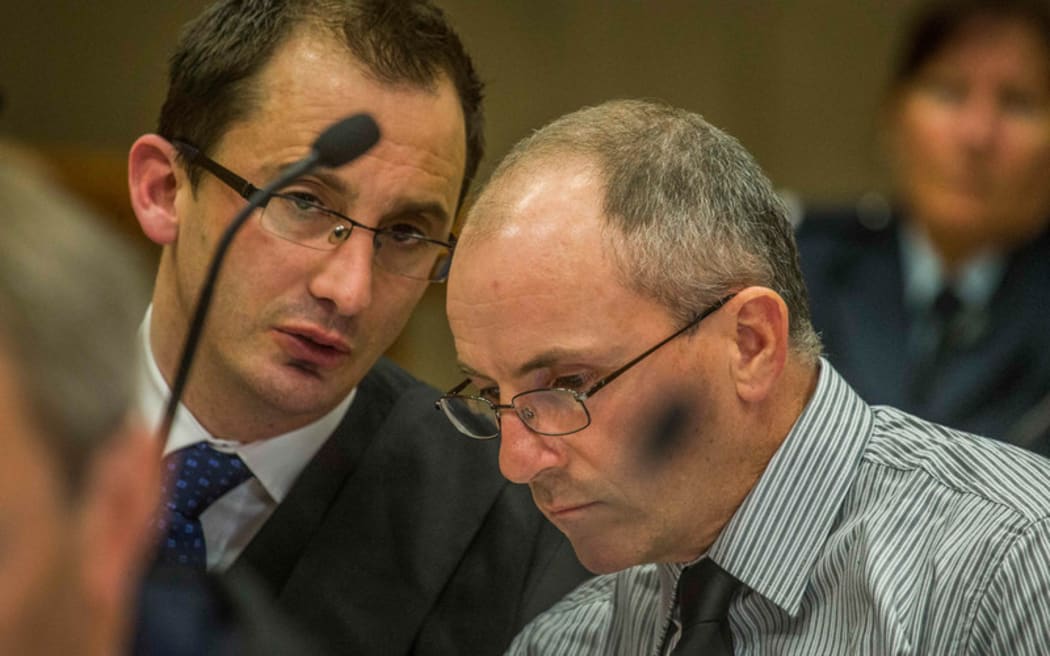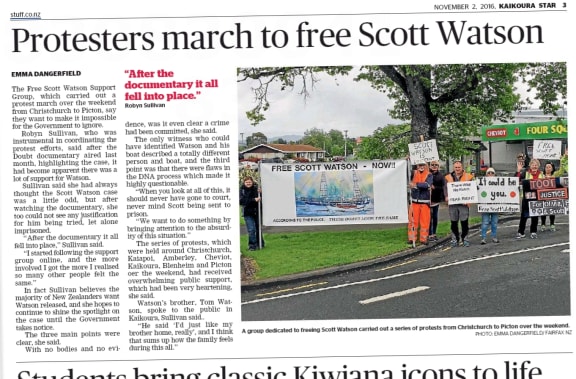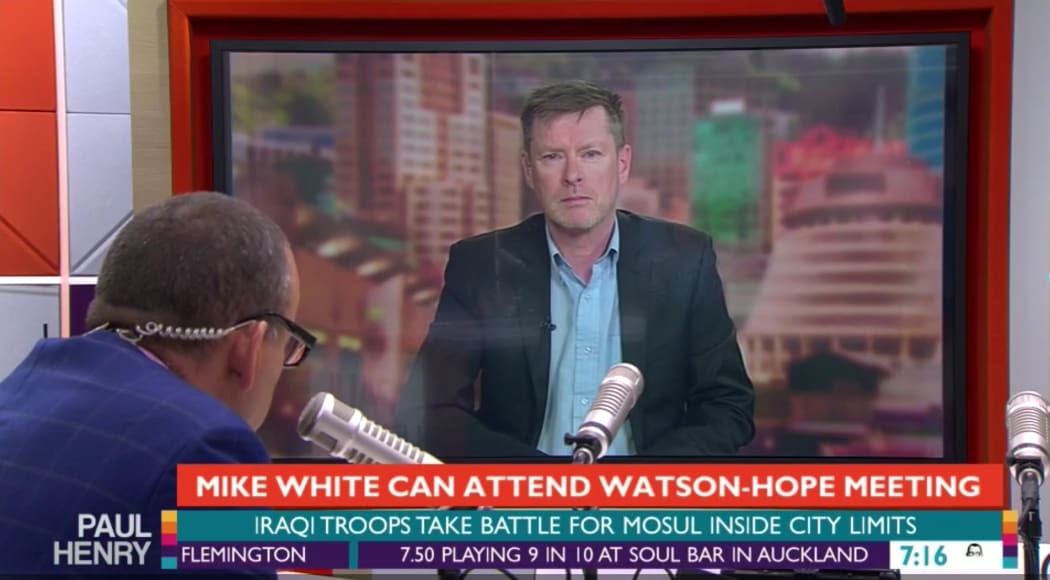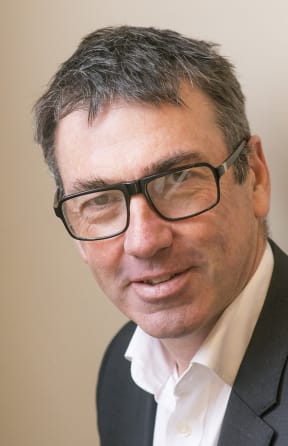Convicted killer Scott Watson has won a fight for the right to talk to a journalist in jail twice in two years. Others behind bars who say they're innocent may follow suit. Is that good for justice?

Scott Watson and lawyer Kerry Cook in Christchurch High Court. Photo: Pool / John Kirk-Anderson
Eighteen years after the killing of Olivia Hope and Ben Smart in the Marlborough Sounds and 17 years after Scott Watson was found guilty, it's still a powerful story for many people who have doubts about his conviction.
The Kaikoura Star reported on a rally of Watson supporters in the town this week.
"After the documentary, it all fell into place," organiser Robyn Sullivan told the paper. She was referring to Doubt, a New Zealand On Air-funded programme about Watson which screened on TVNZ.

Campaigners for Scott Watson in the news this week were partly prompted by coverage of his case in the media. Photo: RNZ / photo
The reporting of journalist Mike White - who has followed the case since 1998 when he was a Marlborough Express reporter - has also had an impact.
Last year, Watson went to court to force Corrections to allow White to meet him in prison.
It is an offence to communicate with a prisoner without permission. Corrections regulations forbid interviewing, recording, filming or photographing a prisoner “for the purpose of obtaining information and publishing or broadcasting it" without prior approval from both Corrections and the prisoner in writing.
Corrections declined his request, but the High Court in 2015 said: "where no concerns of prison security are raised... freedom of expression rights in the Bill of Rights Act should prevail".
Watson and White met behind bars three times in 2015 and Watson's claim of innocence was restated in White's cover story for North and South last December.
Corrections also declined permission for Olivia Hope's father Gerald to meet Watson along with White this year. Watson went to court again - and won again.
Why did Corrections resist the latest meeting?
White’s job as a journalist was the stumbling block.
Corrections said White had interviewed Watson three times last year and published an article highlighting Watson’s claims.
There was no new evidence which needed to be discussed, said Corrections, and the rights to freedom of speech of all three parties could still be exercised without them being in the same room in prison. Corrections also said this was in line with the current policy in the UK.
But Justice Mallon's judgement said Corrections did not demonstrate that interfering with freedom of expression was justified.
"The decision of Corrections . . . that Mr White may not attend the meeting in his capacity as a professional journalist, record the meeting, and potentially write an article about it . . . is quashed. Corrections is directed to reconsider this decision in light of this judgment."
Do they need to meet face-to-face?
In a guide on claims of wrongful conviction for New Zealand journalists, White said many prisoners may not be able to put their case in writing very well. Journalists could also pick up vital clues and cues in the way they behaved.
Face-to-face meetings could give people a better understanding of the jury’s reaction to a prisoner - and if jurors, barristers, judges and police officers have all met them in the flesh and formed an opinion of them - why not the reporter covering their case?

Journalist Mike White talking to Paul Henry on TV3 after the High Court ruled he can meet Scott Watson and Gerald Hope in jail. Photo: screenshot
However, Watson was only advised to pursue interviews with White after all his legal avenues had been exhausted.
"It's clear he's run out of legal appeals and he feels its still important to publicise his case. Having media involvement in his case is one way to keep it alive," White said on TV3 last Tuesday.
And it works.
In her judgment which was made public this week, Justice Mallon mentioned the impact of the North and South article last year.
"Mr White describes the public and media interest that followed as being greater than any story he has written in his 20 year career as a journalist. Sales of this issue were double the average monthly readership of 250,000, with thousands more reading the online publication. New witnesses have come forward. Others have reinforced earlier doubts they had expressed. Offers of assistance have also been forthcoming."
"It do think its sets a precedent and so it should," Christchurch lawyer Duncan Webb said of the latest High Court judgement.
"Constraining the way in which people in prison can talk to the media is a real concern," he told Mediawatch.

Duncan Webb Photo: supplied
"There is no proper basis on which to tell an imprisoned person not to talk to the media. Imprisonment itself is the punishment. To shut down wider communication isn't part of proper punishment," said Mr Webb.
When Watson appeared in court in 2015, much of the media attention was on his appearance and demeanour - not his case. If journalists are allowed easier access to people in prison, there could be a rash of tabloid-style coverage focusing on prisoners as personalities.
"Corrections should not be seeking to edit the media coverage so only a certain kind of story comes out. We might not like tabloid journalism, but some of the most important stories have found their way into the media through less reputable publications," said Mr Webb.
"I'm concerned that what we have is not out of concern for the best interests of the prisoner or even the victims, but it's constraining wider discussion about what's gone on in the justice system," said Mr Webb.
Mr Webb is a member of The New Zealand Public Interest Project, a group set up last year to investigate claims of miscarriages of justice. Watson’s lawyer Kerry Cook also a member.
In the absence of an independent body to review claims of wrongful conviction - such as the UK's Criminal Cases Review Tribunal - Mr Webb said the media had a critical role.
Will Watson's 'wins' in court encourage lawyers to get more prisoners to meet journalists behind bars in the hope of getting the oxygen of media publicity?
"This is part of the project," he said. "If we can get the media interested it is more likely resources will come the way of that case, which can feed into proper and thorough examination".

